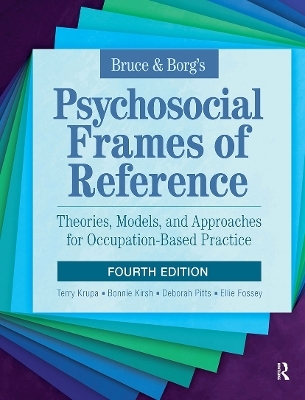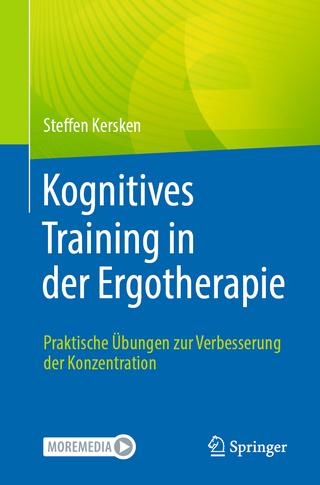
Bruce & Borg’s Psychosocial Frames of Reference
Routledge (Verlag)
978-1-032-95806-4 (ISBN)
- Noch nicht erschienen
- Versandkostenfrei
- Auch auf Rechnung
- Artikel merken
Psychosocial health is a fundamental element of all human health and well-being. Psychological, emotional, and social factors interact to influence peoples’ occupational lives, in turn influencing psychosocial health. Occupational therapists practicing in contemporary health and social sectors require the knowledge, attitudes and skills to identify and address these psychosocial factors.
The classic and renowned, Bruce & Borg’s Psychosocial Frames of Reference: Theories, Models, and Approaches for Occupation-Based Practice, Fourth Edition by Drs. Terry Krupa, Bonnie Kirsh, and their contributors, examines psychosocial models of practice and their application across a wide range of practice areas in occupational therapy, instead of being singularly focused on practice areas of the needs of people living with identified mental illnesses. Efforts have been made to highlight the relevance of specific models to practice for people with mental illnesses, particularly where the issues experienced by this group have historically been poorly addressed. The authors have also organized models and practice approaches according to the level at which they intervene to create change – occupation, person, environment, and transdisciplinary levels.
As their central domain of concern, the first group of occupational models or approaches have a focus on “what people do” in their daily lives. A second group of models reflect those that intervene at the level of the person. This group understands strengths and problems in occupation as evolving largely from features or qualities of the individual, and the therapeutic processes suggested are directed to changing or building upon these features. A third group of models and approaches focus on the psychosocial context and environment to elicit and enable a positive change in occupation. In some cases, these environmental models expand commonly-held, narrow definitions of “clinical” practice to encourage occupational therapists to engage in population-level practices. Finally, a small group of models of practice are labeled as transdisciplinary. Transdisciplinary models provide ways to develop conceptualizations of psychosocial practice issues, practice language, and approaches that are shared across disciplinary boundaries.
New in the completely updated Fourth Edition:
Contains models and practice approaches that are useful in enabling occupational therapists to address psychosocial concerns relevant to human occupation
Explores the psychological, emotional, and social experiences of humans carried out in context and their linkages to occupational engagement and well-being
Puts forward practice models that focus on person-level aspects of occupation in psychosocial practice
Examines transdisciplinary models and their relationship to psychosocial occupational therapy concepts and practices
Presents well established models and frameworks that focus on population and contextual level factors relevant to psychosocial occupational therapy practice
Discusses occupational therapy intervention approaches flowing from these models, relevant tools and practices, and, where available, the supporting evidence-base
Included with the text are online supplemental materials for faculty use in the classroom.
With its updated models and a wide range of practice areas, Bruce & Borg’s Psychosocial Frames of Reference: Theories, Models, and Approaches for Occupation-Based Practice, Fourth Edition is the perfect resource for the occupational therapist student, faculty, and clinician or any practitioner in psychosocial and mental health.
Terry Krupa, PhD, OT Reg (Ont), FCAOT is a Professor in the Occupational Therapy Program of the School of Rehabilitation Therapy at Queen’s University, Canada. She holds cross appointments in the Department of Psychiatry and the School of Nursing. She has practiced in the mental health field for over 30 years, as a clinician, educator, and researcher/scholar. Terry has been involved in the development and evaluation of a range of services and intervention approaches focused on improving the health, well-being, and full community participation of people living with mental illness. Terry has been the recipient of the Canadian Association of Occupational Therapist’s Muriel Driver and Leadership Awards. She was the inaugural recipient of the Pioneer Award for Recovery Research presented by Psychosocial Rehabilitation Canada. Bonnie Kirsh, PhD, OT Reg (Ont) is an Associate Professor in the Department of Occupational Science and Occupational Therapy, with cross appointments to the Rehabilitation Sciences Institute and the Department of Psychiatry at the University of Toronto. Prior to becoming an academic, she was a clinician and an administrator in the field of occupational therapy and mental health. Her work focuses on community engagement for people experiencing mental illnesses, with a focus on systems, services, and interventions that enable people to obtain and maintain meaningful and productive roles. Bonnie was appointed to the Mental Health Commission of Canada and has participated on boards of community mental health agencies. She has also been the recipient of the Canadian Association of Occupational Therapist’s Muriel Driver Award. Deborah Pitts, PhD, OTR/L, BCMH, CPRP is an Assistant Professor of Clinical Occupational Therapy in the USC Chan Division of Occupational Science and Occupational Therapy. She has developed an expertise in the philosophy and practice of psychiatric rehabilitation with a particular interest in how occupation influences the “lived experience” of recovery for persons labeled with psychiatric disabilities. Deborah has served as an occupational therapy clinician, educator, scholar, and consultant, and as a surveyor for behavioral health facilities in the United States. Deborah has worked actively to advance the mental health knowledge and practice in occupational therapy, through her leadership in the American Occupational Therapy Association (AOTA) Mental Health Special Interest Section and in the development of the competencies for AOTA Board Certification in Mental Health. She was the 2011 recipient of Occupational Therapy Association of California’s Annual Practice Award in acknowledgment of her long-standing commitment to advocating for the role of occupational therapy in mental health Ellie Fossey, PhD, MSc, DipCOT (UK) has conducted occupational therapy research and taught in occupational therapy undergraduate and postgraduate programs at La Trobe University in Melbourne for over 20 years, as well as in Singapore, and previous positions in South Australia and Coventry, England. Ellie is a member of La Trobe University’s Living with Disability Research Centre and an Honorary Fellow in the Department of Psychiatry, The University of Melbourne. Her research and teaching focus on frameworks for understanding people’s everyday lives and occupations, the ways in which these may be affected by health conditions and changing life circumstances, and on occupation-focused practices. Ellie’s research has predominantly attended to time use, education, and work-related issues faced by people whose lives are disrupted by mental health issues. She is widely published in occupational therapy, disability, and mental health journals and has particular interests in using qualitative and collaborative approaches to research within these fields.
Dedication Acknowledgments About the Editors Contributing Authors Introduction Section I Introduction to Psychosocial Occupational Therapy Chapter 1Defining Psychosocial Practice in Occupational TherapyTerry Krupa, PhD, OT Reg (Ont), FCAOT Chapter 2 Evolution of Psychosocial Practice in Occupational TherapyLynn Cockburn, PhD, MEd, MSPH, OT Reg (Ont), OT(C) Section II Transdisciplinary Models and Frameworks Chapter 3 Recovery FrameworksDeborah Pitts, PhD, OTR/L, BCMH, CPRP and Erin McIntyre, OTD Chapter 4 Transdisciplinary Models of Disability: Applications to Psychosocial PracticeTerry Krupa, PhD, OT Reg (Ont), FCAOT and Ellie Fossey, PhD, MSc, DipCOT (UK) Section III Occupational Models and Frameworks Chapter 5 Occupation and MeaningEllie Fossey, PhD, MSc, DipCOT (UK); Terry Krupa, PhD, OT Reg (Ont), FCAOT; andLarry Davidson, PhD Chapter 6 The Drive and Motivation for OccupationTerry Krupa, PhD, OT Reg (Ont), FCAOT Chapter 7 Person-Environment-Occupation Model Applied to Mental HealthPatricia Rigby, PhD, OT Reg (Ont) and Bonnie Kirsh, PhD, OT Reg (Ont) Chapter 8 Canadian Triple Model Framework for Enabling OccupationTerry Krupa, PhD, OT Reg (Ont), FCAOT Chapter 9 The Model of Human Occupation: A Framework for Occupation-Focused PracticeEllie Fossey, PhD, MSc, DipCOT (UK) Chapter 10 Patterns of Participation: Time Use and Occupational BalanceEllie Fossey, PhD, MSc, DipCOT (UK) and Terry Krupa, PhD, OT Reg (Ont), FCAOT Section IV Person-Level Models and Frameworks Chapter 11 Learning and OccupationBonnie Kirsh, PhD, OT Reg (Ont) Chapter 12 Processes of Thought and OccupationBonnie Kirsh, PhD, OT Reg (Ont) Chapter 13 Expression and Occupation (Psychodynamic Perspectives)Deborah Pitts, PhD, OTR/L, BCMH, CPRP and Erin McIntyre, OTD Chapter 14 Coping and OccupationTerry Krupa, PhD, OT Reg (Ont), FCAOT Section V Environment-Level Models and Frameworks Chapter 15 Health Promotion and Wellness for Persons With Psychiatric DisabilitiesDeborah Pitts, PhD, OTR/L, BCMH, CPRP and Erin McIntyre, OTD Chapter 16 Organizational Culture Frameworks Related to Mental Health: Implications and Applications for Occupational TherapyRebecca Gewurtz, PhD, OT Reg (Ont) and Bonnie Kirsh, PhD, OT Reg (Ont) Chapter 17 Developing Occupationally Just CommunitiesEllie Fossey, PhD, MSc, DipCOT (UK) and Terry Krupa, PhD, OT Reg (Ont), FCAOT Financial Disclosures Index
| Erscheint lt. Verlag | 4.11.2024 |
|---|---|
| Verlagsort | London |
| Sprache | englisch |
| Maße | 216 x 279 mm |
| Gewicht | 770 g |
| Themenwelt | Medizin / Pharmazie ► Physiotherapie / Ergotherapie ► Ergotherapie |
| ISBN-10 | 1-032-95806-5 / 1032958065 |
| ISBN-13 | 978-1-032-95806-4 / 9781032958064 |
| Zustand | Neuware |
| Informationen gemäß Produktsicherheitsverordnung (GPSR) | |
| Haben Sie eine Frage zum Produkt? |
aus dem Bereich


